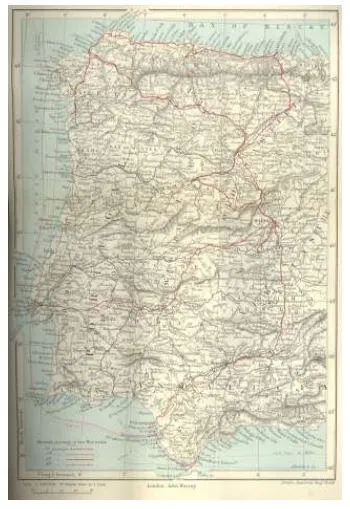George Borrow - The Bible in Spain. Volume 1 of 2
Здесь есть возможность читать онлайн «George Borrow - The Bible in Spain. Volume 1 of 2» — ознакомительный отрывок электронной книги совершенно бесплатно, а после прочтения отрывка купить полную версию. В некоторых случаях можно слушать аудио, скачать через торрент в формате fb2 и присутствует краткое содержание. Жанр: Путешествия и география, foreign_prose, foreign_language, на английском языке. Описание произведения, (предисловие) а так же отзывы посетителей доступны на портале библиотеки ЛибКат.
- Название:The Bible in Spain. Volume 1 of 2
- Автор:
- Жанр:
- Год:неизвестен
- ISBN:нет данных
- Рейтинг книги:5 / 5. Голосов: 1
-
Избранное:Добавить в избранное
- Отзывы:
-
Ваша оценка:
- 100
- 1
- 2
- 3
- 4
- 5
The Bible in Spain. Volume 1 of 2: краткое содержание, описание и аннотация
Предлагаем к чтению аннотацию, описание, краткое содержание или предисловие (зависит от того, что написал сам автор книги «The Bible in Spain. Volume 1 of 2»). Если вы не нашли необходимую информацию о книге — напишите в комментариях, мы постараемся отыскать её.
The Bible in Spain. Volume 1 of 2 — читать онлайн ознакомительный отрывок
Ниже представлен текст книги, разбитый по страницам. Система сохранения места последней прочитанной страницы, позволяет с удобством читать онлайн бесплатно книгу «The Bible in Spain. Volume 1 of 2», без необходимости каждый раз заново искать на чём Вы остановились. Поставьте закладку, и сможете в любой момент перейти на страницу, на которой закончили чтение.
Интервал:
Закладка:
Note. – Places enclosed in square brackets are not marked on the map.

CHAPTER I
Man overboard – The Tagus – Foreign Languages – Gesticulation – Streets of Lisbon – The Aqueduct – Bible tolerated in Portugal – Cintra – Don Sebastian – John de Castro – Conversation with a Priest – Colhares – Mafra – Its Palace – The Schoolmaster – The Portuguese – Their Ignorance of Scripture – Rural Priesthood – The Alemtejo.
On the morning of November 10, 1835, 17 17 Mendizabal had become Premier and Minister of Finance in September, and the new Cortes was opened at Madrid by a speech from the throne on November 16.
I found myself off the coast of Galicia, whose lofty mountains, gilded by the rising sun, presented a magnificent appearance. I was bound for Lisbon; we passed Cape Finisterre, and, standing farther out to sea, speedily lost sight of land. On the morning of the 11th the sea was very rough, and a remarkable circumstance occurred. I was on the forecastle, discoursing with two of the sailors: one of them, who had but just left his hammock, said, “I have had a strange dream, which I do not much like; for,” continued he, pointing up to the mast, “I dreamt that I fell into the sea from the cross-trees.” He was heard to say this by several of the crew besides myself. A moment after the captain of the vessel, perceiving that the squall was increasing, ordered the topsails to be taken in, whereupon this man, with several others, instantly ran aloft; the yard was in the act of being hauled down, when a sudden gust of wind whirled it round with violence, and a man was struck down from the cross-trees into the sea, which was working like yeast below. In a short time he emerged; I saw his head on the crest of a billow, and instantly recognized in the unfortunate man the sailor who, a few moments before, had related his dream. I shall never forget the look of agony he cast whilst the steamer hurried past him. The alarm was given, and everything was in confusion; it was two minutes at least before the vessel was stopped, by which time the man was a considerable way astern: I still, however, kept my eye upon him, and could see that he was struggling gallantly with the waves. A boat was at length lowered, but the rudder was unfortunately not at hand, and only two oars could be procured, with which the men could make but little progress in so rough a sea. They did their best, however, and had arrived within ten yards of the man, who still struggled for his life, when I lost sight of him; and the men, on their return, said that they saw him below the water, at glimpses, sinking deeper and deeper, his arms stretched out and his body apparently stiff, but that they found it impossible to save him. Presently after, the sea, as if satisfied with the prey which it had acquired, became comparatively calm. The poor fellow who perished in this singular manner was a fine young man of twenty-seven, the only son of a widowed mother; he was the best sailor on board, and was beloved by all who were acquainted with him. This event occurred on the 11th of November, 1835; the vessel was the London Merchant steamship. Truly wonderful are the ways of Providence!
That same night we entered the Tagus, and dropped anchor before the old tower of Belem; 18 18 Bethlehem . The church was founded on the spot where Vasco da Gama embarked for his memorable voyage, July 8, 1497.
early the next morning we weighed, and, proceeding onward about a league, we again anchored at a short distance from the Caesodré , 19 19 More correctly Caes do Sodré , now the Praça dos Romulares .
or principal quay of Lisbon. Here we lay for some hours beside the enormous black hulk of the Rainha Nao , a man-of-war which in old times so captivated the eye of Nelson, that he would fain have procured it for his native country. She was, long subsequently, the admiral’s ship of the Miguelite squadron, and had been captured by the gallant Napier 20 20 Sir Charles Napier (1786–1860) defeated and destroyed the Miguelite squadron off Cape St. Vincent on July 3, 1833.
about three years previous to the time of which I am speaking.
The Rainha Nao is said to have caused him more trouble than all the other vessels of the enemy; and some assert that, had the others defended themselves with half the fury which the old vixen queen displayed, the result of the battle which decided the fate of Portugal would have been widely different.
I found disembarkation at Lisbon to be a matter of considerable vexation; the custom-house officers were exceedingly uncivil, and examined every article of my little baggage with most provoking minuteness.
My first impression on landing in the Peninsula was by no means a favourable one; and I had scarcely pressed the soil one hour before I heartily wished myself back in Russia, a country which I had quitted about one month previous, and where I had left cherished friends and warm affections.
After having submitted to much ill usage and robbery at the custom-house, I proceeded in quest of a lodging, and at last found one, but dirty and expensive. The next day I hired a servant, a Portuguese, it being my invariable custom, on arriving in a country, to avail myself of the services of a native, chiefly with the view of perfecting myself in the language; and, being already acquainted with most of the principal languages and dialects of the east and the west, I am soon able to make myself quite intelligible to the inhabitants. In about a fortnight I found myself conversing in Portuguese with considerable fluency.
Those who wish to make themselves understood by a foreigner in his own language should speak with much noise and vociferation, opening their mouths wide. Is it surprising that the English are, in general, the worst linguists in the world, seeing that they pursue a system diametrically opposite? For example, when they attempt to speak Spanish – the most sonorous tongue in existence – they scarcely open their lips, and, putting their hands in their pockets, fumble lazily, instead of applying them to the indispensable office of gesticulation. Well may the poor Spaniards exclaim, These English talk so crabbedly , that Satan himself would not be able to understand them .
Lisbon is a huge ruinous city, still exhibiting, in almost every direction, the vestiges of that terrific visitation of God, the earthquake, which shattered it some eighty years ago. It stands on seven hills, the loftiest of which is occupied by the castle of Saint George, which is the boldest and most prominent object to the eye, whilst surveying the city from the Tagus. The most frequented and busy parts of the city are those comprised within the valley to the north of this elevation.
Here you find the Plaza of the Inquisition, the principal square in Lisbon, 21 21 One of the peculiarities of Lisbon is the number and variety of the names borne by the same street or square. This noble square, nearly 600 feet long by 500 wide, is, as may be supposed, no longer known by the name of the detested Inquisition, but is officially designated Praça do Commercio ; it is invariably spoken of by the Portuguese inhabitants as the Terreiro do Paço , and by the English as Blackhorse Square, from the fine equestrian statue of King José I., erected in 1775.
from which run parallel, towards the river, three or four streets, amongst which are those of the gold and silver, so designated from being inhabited by smiths cunning in the working of those metals; they are, upon the whole, very magnificent. The houses are huge, and as high as castles. Immense pillars defend the causeway at intervals, producing, however, rather a cumbrous effect. These streets are quite level, and are well paved, in which respect they differ from all the others in Lisbon. The most singular street, however, of all is that of the Alecrim , or Rosemary, which debouches on the Caesodré . It is very precipitous, and is occupied on either side by the palaces of the principal Portuguese nobility, massive and frowning, but grand and picturesque edifices, with here and there a hanging garden, overlooking the street at a great height.
Интервал:
Закладка:
Похожие книги на «The Bible in Spain. Volume 1 of 2»
Представляем Вашему вниманию похожие книги на «The Bible in Spain. Volume 1 of 2» списком для выбора. Мы отобрали схожую по названию и смыслу литературу в надежде предоставить читателям больше вариантов отыскать новые, интересные, ещё непрочитанные произведения.
Обсуждение, отзывы о книге «The Bible in Spain. Volume 1 of 2» и просто собственные мнения читателей. Оставьте ваши комментарии, напишите, что Вы думаете о произведении, его смысле или главных героях. Укажите что конкретно понравилось, а что нет, и почему Вы так считаете.












